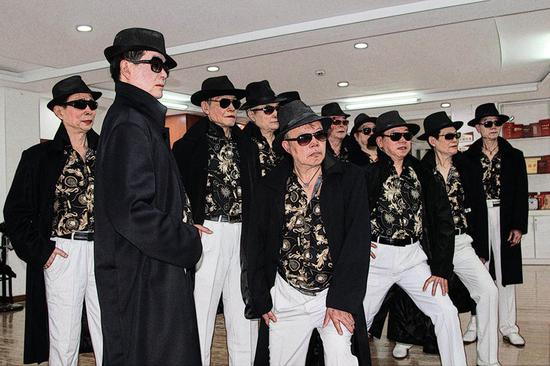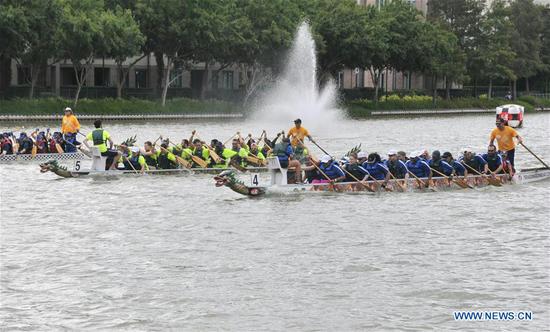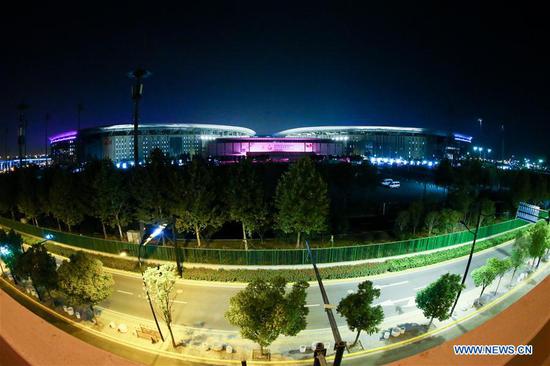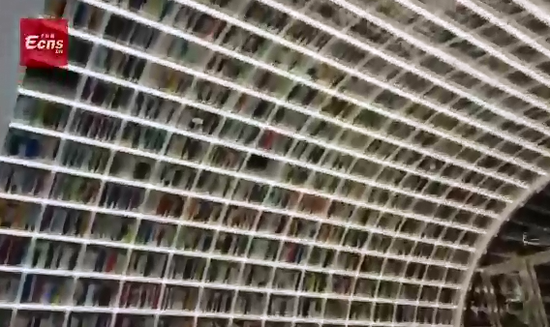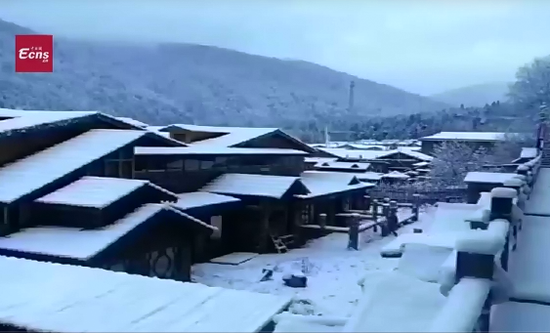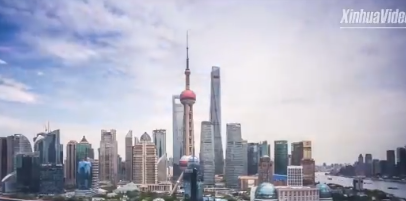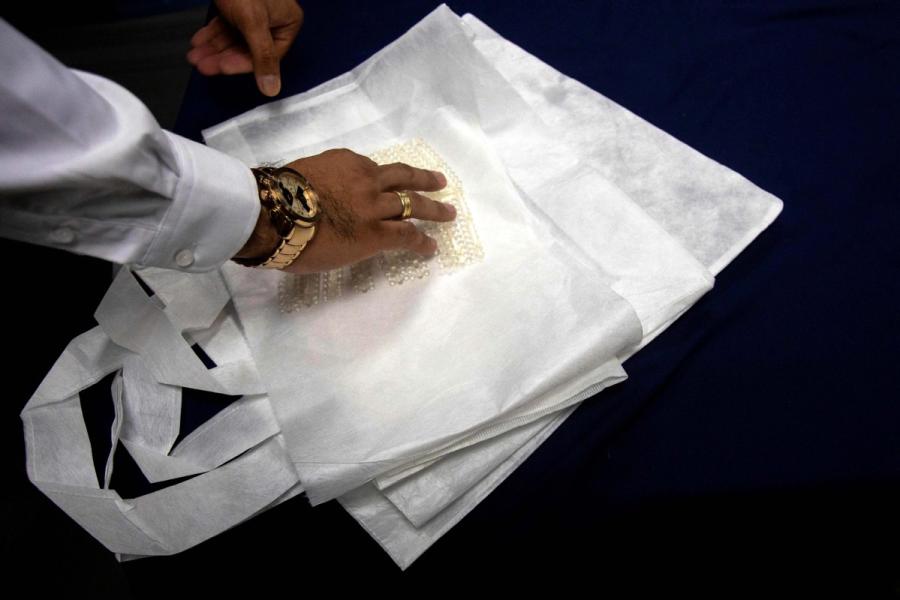
Bags made from PVA, a water-soluble material, are displayed at a media briefing in Santiago, Chile, in July. (CLAUDIO REYES/FOR CHINA DAILY)
The innovation, jointly developed in China, could reduce the threat the material poses in seas across the world.
Chilean businessman Roberto Astete has had the same dream for several years: used plastic cutlery from a dinner party is automatically sorted and fed into small grinders, after which the debris is dissolved in water in just a few minutes before being flushed away.
"We wouldn't need to collect, transport and dispose of plastic waste at special facilities anymore. It could be processed easily on-site to reduce ocean pollution," he said.
Now, Astete's dream is almost a reality thanks to a new material and processing technology devised by his partner company in South China.
In late July, Astete's company Solubag SpA and Polye Materials Co, in Guangdong province, jointly launched a series of soluble shopping bags in Santiago, capital of Chile, just before the Chilean government enacted a law that banned businesses from providing customers with free plastic bags.
It takes centuries for petrochemical plastic bags to degrade in the ocean-in the meantime they choke marine animals and harm the entire ecosystem.
The bag introduced by the two companies dissolves in water quickly, and Astete even drank the mixture during a press conference to endorse its safety.
According to Chen Gang, chairman of Polyrocks Chemical Co, Polye's parent company, the bag is made from modified polyvinyl alcohol, aka PVA, which comes from natural gas or calcium carbide.
"PVA bags dissolve in water in minutes so they won't choke marine animals. The solution will not pollute water or soil," Chen said. "This alternative to plastic bags is eco-friendly."
PVA has been used in paint, glue and textile manufacturing since the 1930s, and PVA film has also been widely used for packaging in recent years.
However, it was difficult and costly to process the material into shopping bags because of its lack of thermoplasticity (pliability when heated), said Cui Yuefei, the bag's inventor and a senior engineer with the South China University of Technology in Guangzhou, capital of Guangdong.
Cui spent years modifying PVA in laboratories and completed his experiments in 2008. By adding certain agents, he made it easier for the material to be pelleted, blow-molded and made into bags.
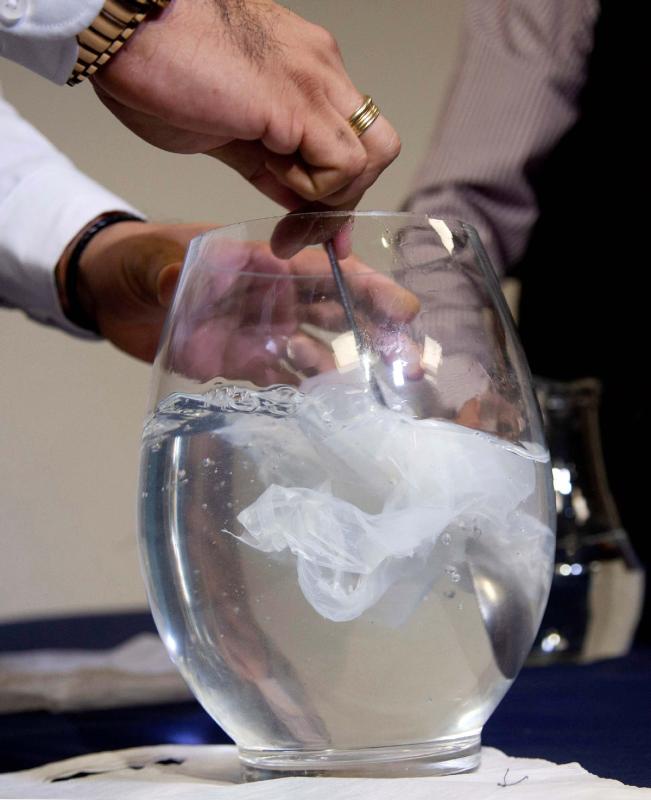
A demonstration of how the material dissolves in water. (CLAUDIO REYES/FOR CHINA DAILY)
Industrialization
His work caught the attention of Polyrocks, renowned for its fire-retardant products, which was exploring new business opportunities. In 2015, the two joined hands in modified PVA industrialization.
"In 2016, we were looking for a suitable blow-molding machine in Dalian, Northeast China," Cui said. "That's when and where we met Astete."
The Chilean entrepreneur had spent two years scouring the world for a company capable of, and interested in, making affordable water-soluble bags.
"I was in the plastics industry and I thought to myself, 'we can't use petrochemical bags anymore'," Astete said. "I tried some European and American manufacturers first, but they showed little interest because the profit margin for shopping bags is very small. Then I came to China."
Cui and Polyrocks first focused on bags that would be soluble in hot water, which would be more durable for everyday use. But Astete, coming from a country with a long coastline, insisted that the bags should be soluble in cold water.
"He helped us make this crucial decision in product development," Cui said.
A prototype was produced in just two months, and Polye Materials was quickly established to service the project.
"The bags launched in Santiago are our third-generation products. Their cost is about 1.5 times of that of a normal plastic bag," Cui said.
"We expect them to be as cheap as normal ones in our fifth generation."
Li Lingyu, general manager of Polye, said the company's annual production of modified PVA pellets will reach 10,000 metric tons by November. "That's about 500 million water-soluble bags," she said.
Astete hopes the bags will hit the shelves in Chile by the end of the year, and he has been trying to persuade his Chinese partner to open factories in his home country.
"After our press conference, I got so many calls, and there are thousands of email inquiries in my inbox. It's crazy, really, really crazy," he said.
"We need to further increase our capacity. Eighty-five percent of the inquiries are from outside Chile, places such as Mexico, Germany, France and Spain."
Polye and Solubag plan to start a joint venture in Hong Kong to deal with global sales.
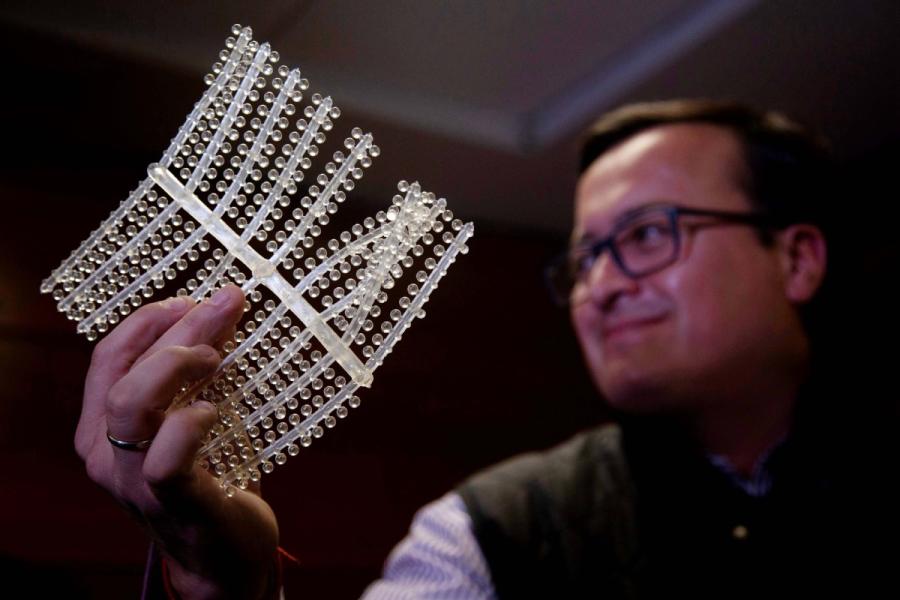
Engineer Christian Olivares shows a sheet of PVA, which could help prevent ecological damage in the world's oceans. (CLAUDIO REYES/FOR CHINA DAILY)
A major threat
Plastic pollution is considered a major threat to oceans worldwide.
During World Oceans Day on June 8, Antonio Guterres, secretary-general of the United Nations, called on the world to stop plastic pollution contaminating the oceans.
Eighty percent of all pollution in the sea comes from the land, including about 8 million tons of plastic waste every year, which has resulted in the deaths of 1 million seabirds and 100,000 marine mammals.
Besides Chile, Britain is set to ban all sales of single-use plastics, including plastic straws and cotton swabs. Kenya and Morocco already have similar restrictions.
"Bags are just the start. We can also use modified PVA to make glass lids, straws and diapers, and to replace products made from petrochemical plastics," Astete said.
"My country is small but the people share a similar goal-to have a beautiful, clean environment. It's also the aspiration of all humanity."

Chilean entrepreneur Roberto Astete (left) stands with Olivares and drinks a solution of water and dissolved PVA to prove it is safe to consume the mixture. (CLAUDIO REYES/FOR CHINA DAILY)










